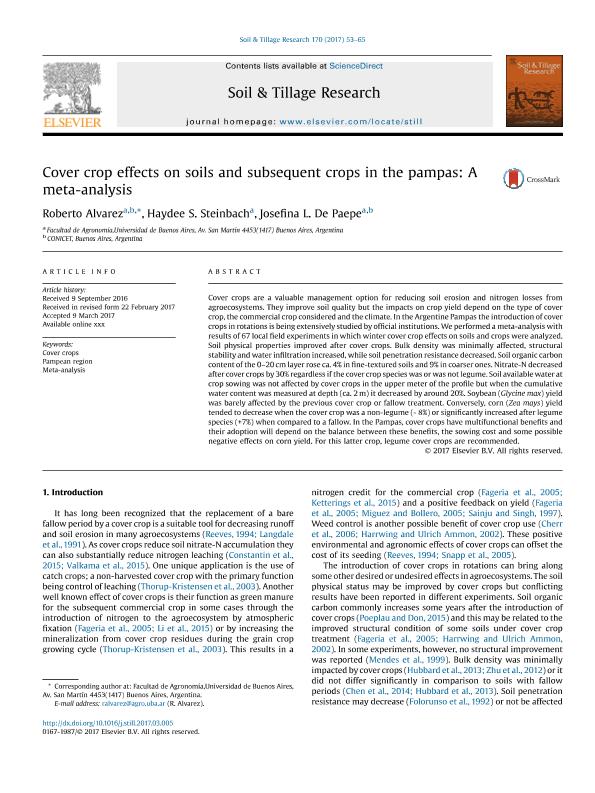Mostrar el registro sencillo del ítem
dc.contributor.author
Alvarez, Roberto

dc.contributor.author
Steinbach, Haydee Sara

dc.contributor.author
de Paepe, Josefina

dc.date.available
2018-08-15T21:00:02Z
dc.date.issued
2017-07
dc.identifier.citation
Alvarez, Roberto; Steinbach, Haydee Sara; de Paepe, Josefina; Cover crop effects on soils and subsequent crops in the pampas: A meta-analysis; Elsevier Science; Soil & Tillage Research; 170; 7-2017; 53-65
dc.identifier.issn
0167-1987
dc.identifier.uri
http://hdl.handle.net/11336/55762
dc.description.abstract
Cover crops are a valuable management option for reducing soil erosion and nitrogen losses from agroecosystems. They improve soil quality but the impacts on crop yield depend on the type of cover crop, the commercial crop considered and the climate. In the Argentine Pampas the introduction of cover crops in rotations is being extensively studied by official institutions. We performed a meta-analysis with results of 67 local field experiments in which winter cover crop effects on soils and crops were analyzed. Soil physical properties improved after cover crops. Bulk density was minimally affected, structural stability and water infiltration increased, while soil penetration resistance decreased. Soil organic carbon content of the 0–20 cm layer rose ca. 4% in fine-textured soils and 9% in coarser ones. Nitrate-N decreased after cover crops by 30% regardless if the cover crop species was or was not legume. Soil available water at crop sowing was not affected by cover crops in the upper meter of the profile but when the cumulative water content was measured at depth (ca. 2 m) it decreased by around 20%. Soybean (Glycine max) yield was barely affected by the previous cover crop or fallow treatment. Conversely, corn (Zea mays) yield tended to decrease when the cover crop was a non-legume (- 8%) or significantly increased after legume species (+7%) when compared to a fallow. In the Pampas, cover crops have multifunctional benefits and their adoption will depend on the balance between these benefits, the sowing cost and some possible negative effects on corn yield. For this latter crop, legume cover crops are recommended.
dc.format
application/pdf
dc.language.iso
eng
dc.publisher
Elsevier Science

dc.rights
info:eu-repo/semantics/openAccess
dc.rights.uri
https://creativecommons.org/licenses/by-nc-nd/2.5/ar/
dc.subject
Cover Crops
dc.subject
Meta-Analysis
dc.subject
Pampean Region
dc.subject.classification
Agricultura

dc.subject.classification
Agricultura, Silvicultura y Pesca

dc.subject.classification
CIENCIAS AGRÍCOLAS

dc.title
Cover crop effects on soils and subsequent crops in the pampas: A meta-analysis
dc.type
info:eu-repo/semantics/article
dc.type
info:ar-repo/semantics/artículo
dc.type
info:eu-repo/semantics/publishedVersion
dc.date.updated
2018-08-14T18:39:30Z
dc.journal.volume
170
dc.journal.pagination
53-65
dc.journal.pais
Países Bajos

dc.journal.ciudad
Amsterdam
dc.description.fil
Fil: Alvarez, Roberto. Universidad de Buenos Aires. Facultad de Agronomía; Argentina. Consejo Nacional de Investigaciones Científicas y Técnicas; Argentina
dc.description.fil
Fil: Steinbach, Haydee Sara. Universidad de Buenos Aires. Facultad de Agronomía; Argentina
dc.description.fil
Fil: de Paepe, Josefina. Universidad de Buenos Aires. Facultad de Agronomía; Argentina. Consejo Nacional de Investigaciones Científicas y Técnicas; Argentina
dc.journal.title
Soil & Tillage Research

dc.relation.alternativeid
info:eu-repo/semantics/altIdentifier/doi/http://dx.doi.org/10.1016/j.still.2017.03.005
dc.relation.alternativeid
info:eu-repo/semantics/altIdentifier/url/https://www.sciencedirect.com/science/article/pii/S0167198717300594
Archivos asociados
